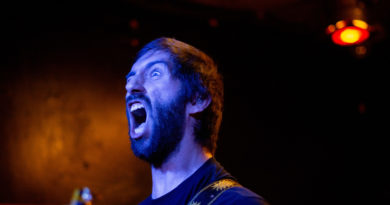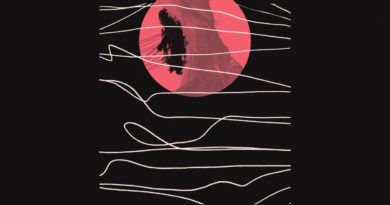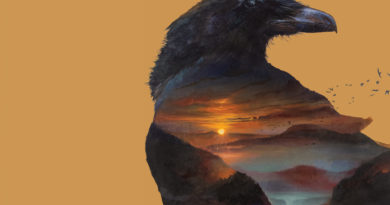Déception – Entrevista a (813)
La humanidad como recurso en el black metal urbano
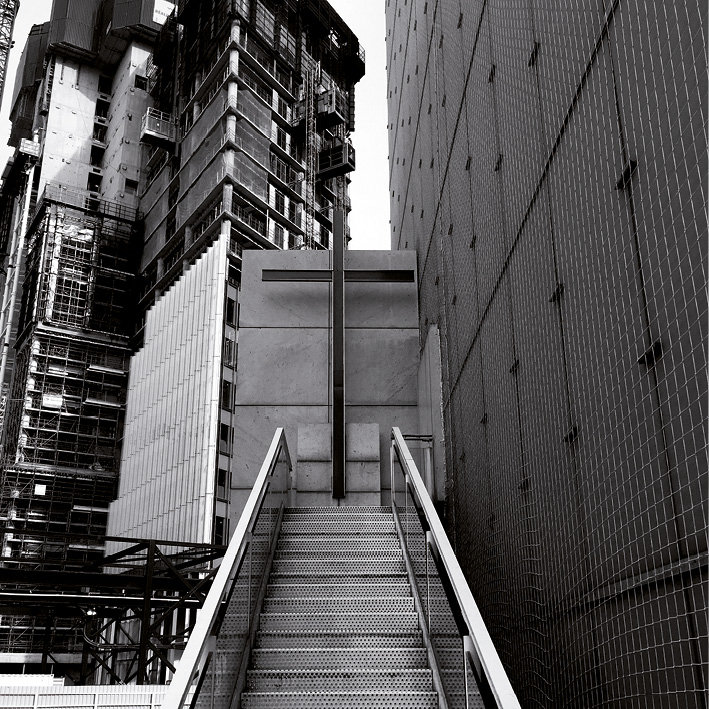
(english version below)
Ressources Humaines es el disco de Déception que ha capitalizado gran parte de las noches de quienes esto escriben durante el período de confinamiento. Hemos tenido la suerte de ver respondidas unas preguntas por parte de su alma máter, (813), en las que nos explica espléndidamente la trayectoria, conceptos y próximos pasos de este proyecto musical orientado a la empresa y basado en valores burocráticos. A nosotros nos venció desde el mismo día en que nos expusimos a su black metal áspero representado en imágenes de vacíos entornos urbanos entregados al negocio y existencias tan rechazadas de cara al exterior como deseadas. Os dejamos con esta reflexión de su primer disco, el vídeo que nos descubrió este proyecto y la entrevista..
La vida es suficientemente corta como para soportarla mientras esperamos nuestro fin. La contemplación de nuestro vacío interior es suficiente para hacernos creer en lo que no debemos ser; no este montón informe de cadáveres que nos compone sino más bien un cráter gigante rodeado de carne. En el medio, esta nada, este vacío espacial sin estrellas, alrededor del cual nos gusta girar indefinidamente hasta que la curiosidad, o la desesperación, nos empuja a tocarlo y a caer allí irremediablemente. Y si, por desgracia, nuestras fútiles interconexiones llegan a invadir esta nada, entonces todo esto se ve impulsado hacia el borde para dejar solo una pizarra de tinta con nuestros recuerdos amplificados a diferentes volúmenes. Si tenemos derecho a no vivir y a no morir, ¿no deberíamos desistir humildemente en favor de nuestro prójimo? Morir solo y con nuestras propias manos es el regalo más hermoso que podemos ofrecer a nuestra humanidad.
ATENEO OCULTO: Lo primero de todo, agradeceros el participar en esta (mi) primera entrevista para Ateneo Oculto (aquí la primera de todas). Soy consciente de que he perdido el control en la longitud así que, por favor, sed pacientes y perdonad todo el relleno, las equivocaciones, prejuicios y falacias en que pueda incurrir.
No estoy seguro de que como llegué al vídeo de Ressources Humaines en Youtube pero sí que me impactó fuerte. De ahí fui directamente a bandcamp y leí que estaba grabado como directo en estudio. ¿Fue ideado desde un principio de esta forma? ¿Con un concepto total puramente multimedia?
(813): La idea estaba ahí desde hacía bastante tiempo, al menos cuatro años. Empezó cuando estaba trabajando como ingeniero informático en La Défense cerca de Paris. Es el gran arco que se ve en los visuales que existen gracias a (404) que trabaja como editor de vídeo. Pensamos que quedaría bien tener proyecciones de vídeo en los conciertos así que le comenté si podía hacer vídeos con imágenes de stock para cada canción siguiendo una serie de indicaciones. Nos gusto tanto el vídeo al que él había añadido su propio toque que lo publicamos completo. Seguro que seguiremos trabajando en el futuro en Déception y quizá en otros proyectos.
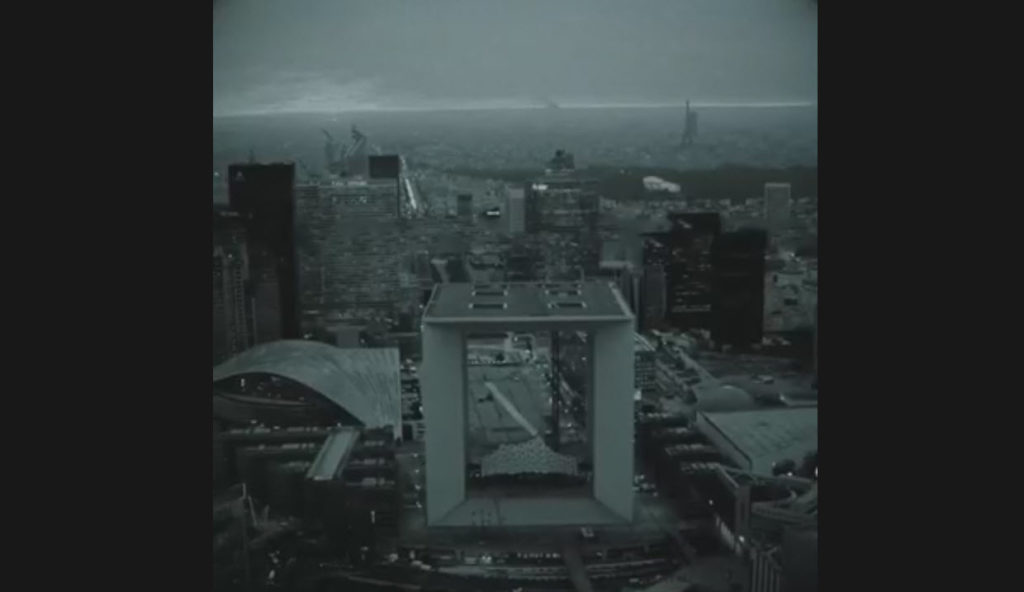
AO: Hemos visto que el primer disco, Vacuité de l’existence, fue grabado solo por ti mientras que en Ressources Humaines lo fue en grupo (por ser directo, claro). Con las mismas personas con ls que también has tocado en concierto. ¿Ves en adelante el proyecto como algo colectivo o seguirá siendo una forma de expresión individual?
(813): Ressources Humaines fue más colectivo de lo habitual porque involucró a muchos amigos, desde la formación para el directo como con (404) en el vídeo. Tuvimos la oportunidad de juntarnos como grupo para un concierto en noviembre de 2019. El próximo disco está siendo grabado en mi habitación pero puede que sí pregunte a otras personas si quieren participar como ya hicimos con (739) en Lueur.
Aunque prefiera centrarme en lo que más me gusta (estar en casa grabando y trabajando con el sonido); (404) trabajó en el vídeo y (739) ayudó a reunir el grupo y organizó el primer concierto. Soy afortunado de ser suficientemente libre para hacer todo lo que quiero artísticamente y de tener amigos que están ahí para ayudarme.
AO: Ressource Humaines cuenta con dos canciones del primer disco, Vacuité de l’existence, el single Mourir y una canción nueva. Creemos que estas canciones tienen un fondo conceptual común, ¿es así? Intentaremos profundizar un poco más adelante, pero ¿puedes decirnos el porqué fueron éstas las elegidas?
(813): Ressources Humaines es el set en directo que hemos estado tocando. Es como un documento de donde estamos como grupo en este momento. Lueur y Heureux, al ser en directo, suenan diferente. Grabé las voces de mi primer disco bajo las sábanas para evitar que los vecinos me oyeran porque vivía en un pequeño estudio en París. Mi voz fue evolucionando con los ensayos.
Elegí Lueur y Heureux por ser más interesantes para tocarlas en directo. Éteins-toi es imposible de tocar porque cambié totalmente el pitch en estudio y no siento que quiera tocar Vacuité en directo; así que compuse Mourir para que fuera la última canción. II A-XVII surgió en el último minuto para tener una intro para el concierto, así que nos quedamos en unos 25 minutos. Después de este primer concierto pensé que podría ser interesante grabarlo en estudio y así surgió Ressources Humaines; como una mezcla en directo con mis amigos. Disfrutamos mucho grabándolo.
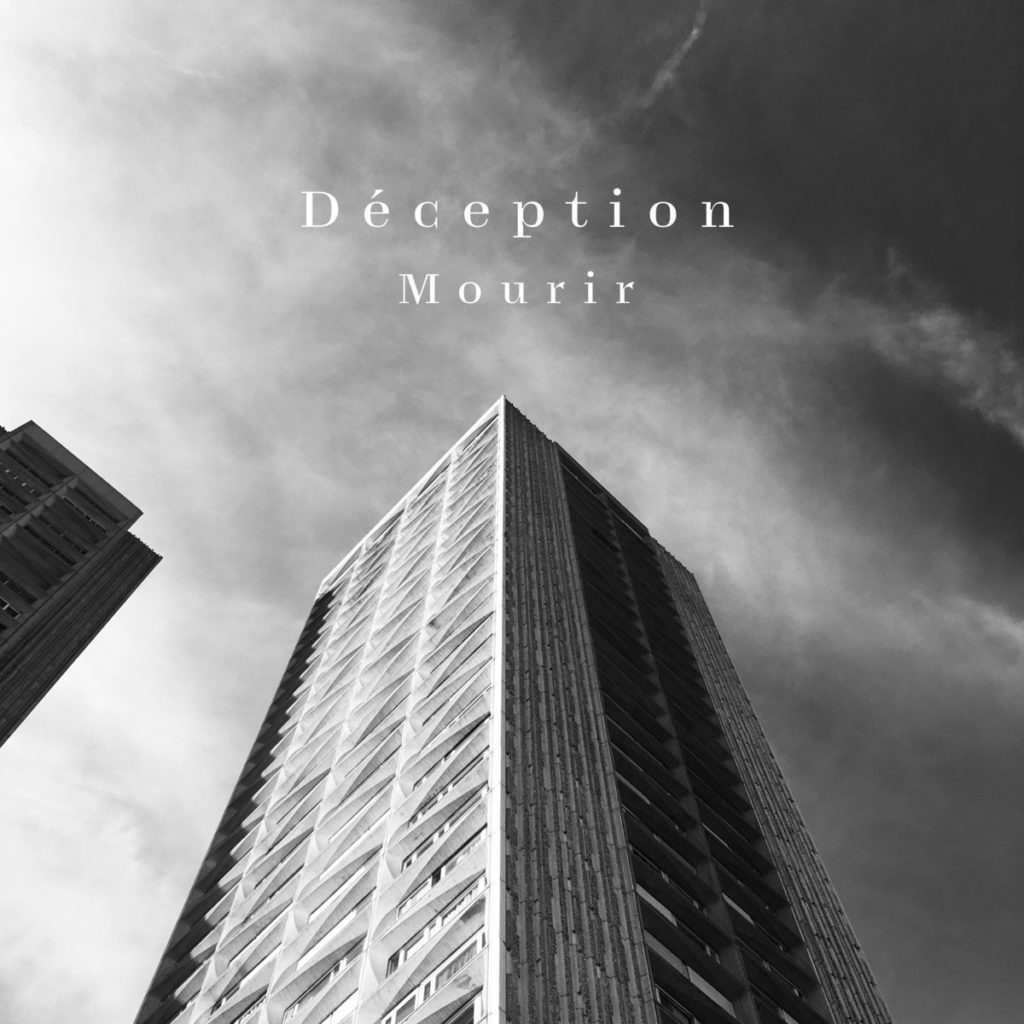
AO: Compré el disco en digital en bandcamp y no hay letras en ningún sitio. Le damos mucha importancia a las letras pero al no ser posible intentaremos mostrar algunas ideas que nos vienen a la mente con las imágenes y el sonido como un intento de ver si existe conexión emocional/conceptual contigo como creador.
(813): El tema de las letras es un punto interesante. Nunca las he escrito. Cuando canto la mayor parte es improvisada y depende del sentimiento general en la canción pero también del momento en que las cante aunque haya frases recurrentes. En Lueur digo “l’obscénité de la lueur / el resplandor es obsceno” en referencia al reflejo en un edificio de cristal. En Heureux, digo “je ne veux plus être heureux / no quiero volver a ser feliz”, en el sentido de no ser feliz como la sociedad espera que lo seamos. En Mourir, “aimer la vie, aimer souffrir / amar la vida, amar el sufrimiento”. Hay momentos felices y depresivos y no los puedes separar. Todo está mezclado y se puede sentir en la música.
La felicidad y la tristeza están conectadas como una misma emoción; así es como lo siento en este proyecto. Suelo decir que, no porque la vida sea difícil a veces es menos agradable. Esta frase sería un lema para mí.
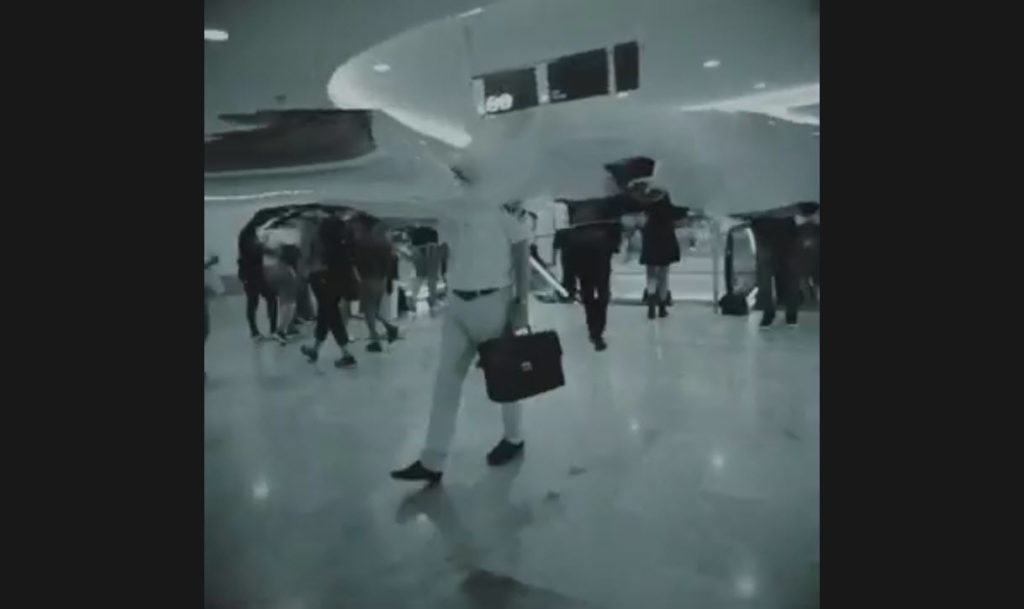
AO: Siguiendo los temas y el vídeo; de primeras soy asaltado por muchas imágenes urbanas magnificentes (y vacías) constreñidas (y asediadas) en un cuadrado (no a ancho completo) y degradadas a una coloración grisácea. Continuamente se deforman y aparecen glitches y errores de codificación. Todo este tratamiento me hace pensar en la brutal sensación de frialdad y vacío que estos altos edificios de acero, calles cuadrículadas y monumentos de cemento transmiten. ¿Esta clase de limpia arquitectura y urbanismo moderno tiene algún papel en el disco?
(813): Está en el disco porque es lo que veo todos los días en la oficina. Es un sentimiento natural. Sobre los glitches en el vídeo, (404) cogió algunos de los vídeos de un sitio de stock y había unas marcas de agua enormes. Encontró un algoritmo para quitarlas pero se creaban muchos deformaciones, y nos encantó el resultado… (404) dice que el glitch es una forma de recordarnos que estamos en un sueño.
AO: La escucha del disco coincidió con el momento de confinamiento por el covid-19. Trabajo como técnico informático y en los primeros días de cierre en Madrid (donde fue ampliamente respetado por la gente) tuve que acercarme a alguna oficina. Realmente me impactaba ver calles y carreteras vacías, y a mi memoria venían continuamente imágenes de vuestro vídeo en youtube. Especialmente un día en que tuve que salir al atardecer y decidí arriesgarme a escuchar el disco mientras cruzaba la ciudad. ¿Crees que el disco puede ser un testimonio viviente de esta época? Entiendo que se ideó y grabó cuando una situación así por una pandemia era casi ciencia ficción. ¿Es el disco algún tipo de retrato de un mundo que se puede deshacer de un día para otro de forma tan sencilla? Creo que el disco no muestra un mundo colapsando pero sí que muestra los errores que existen en el mundo moderno incluso sin pandemia. ¿Te queda alguna sensación del tipo “os lo dije”?
(813): Me conmueve realmente tu relato. En la banda hay tres ingenieros informáticos y afortunadamente pudimos trabajar desde casa, así que nos sentimos casi alegres. En realidad tengo una extraña sensación de que era obvio que esto podía ocurrir. Vi el vídeo un montón de veces mientras trabajábamos en él antes del covid así que en nuestras cabezas ya había ocurrido en realidad. No hay mucho más que decir, no necesitábamos que ocurriera esto pero si puede ser entendido como un testimonio, realmente es un honor. Gracias.
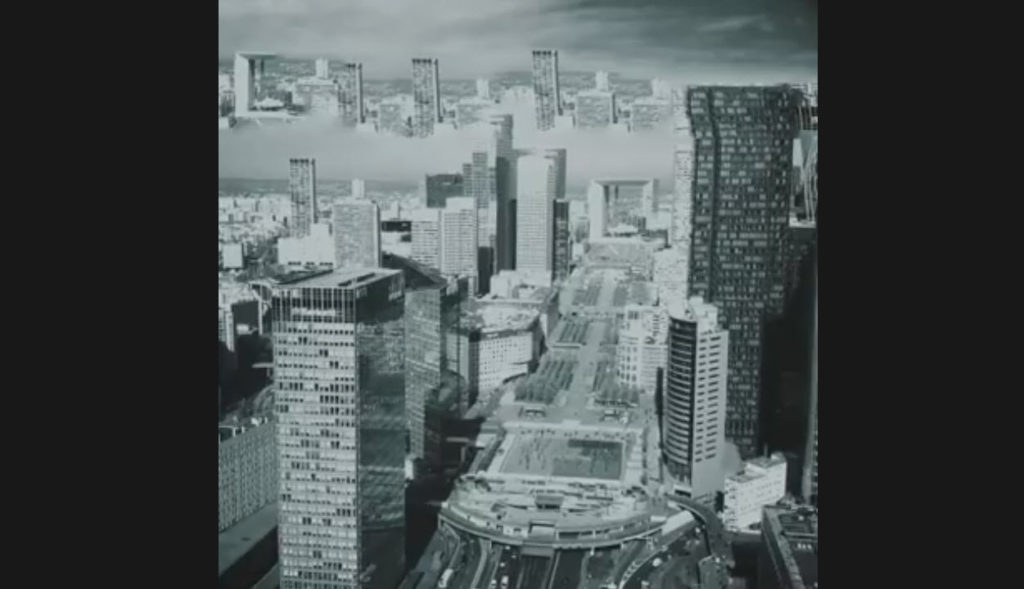
AO: Entonces en Lueur podemos ver el mismo tratamiento visual en el interior de oficinas de diseño y también vacías como ocurría en esos días. Estos espacios comunes falsos e innecesarios habían sido vaciados de su significado y por tanto de su poder. Cuando veía en vuestro vídeo cómo se deshacían las sillas de oficina tuve una sensación de frío realmente confortable. Ahora, el tema (y las imágenes) que realmente me provocan un vuelco al corazón son las de Heureux. La profusión de imágenes de felices parejas y familias blancas de clase media, que podrían aparecer en cualquier anuncio de “fresh banking”, llenas de glitches me destrozaron.
Tratando de escribir de forma inmisericorde sobre metal extremo, ¿debería avergonzarme si tengo algún deseo interior por vivir como en esas imágenes? ¿Puede este disco desvelarme que al mismo tiempo deseo tener un dormitorio en tonos claros y que sé que no tiene sentido desearlo? Una suerte de “recuerdos que desaparecen como lágrimas en la lluvia“, de vivencias reales/falsas que son devoradas por la falta de sentido de la existencia…
(813): Para Heureux le dije a (404) que quería algo totalmente diferente. Quería imágenes de stock de familias felices con niños para mostrar lo que la sociedad espera de ti pero tú ves que es imposible. Esa gente son actores de vídeos de stock, no es la vida real. Así es como me siento; no los entiendo y no me entienden a mí y así será para siempre. (404) y yo estamos de acuerdo en que muestra la vida perfecta en sociedad que nos enseñan desde niños y de la que no formamos parte. Expresamos rechazo pero al tiempo atracción.
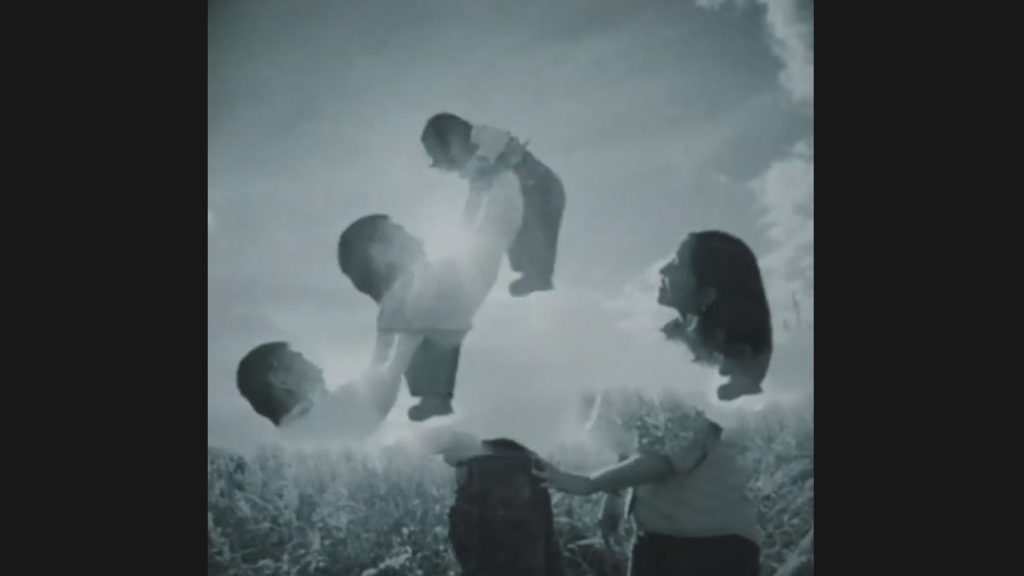
AO: En todo caso, no siento angustia con vuestra música, es una extraña mezcla de tristeza inofensiva, anhelo por lo no vivido y fría contemplación solitaria.
(813): Sí, siento lo mismo. Es la vida. A veces feliz, a veces triste, y a veces todo al mismo tiempo. Lo mejor es cuando se da todo al mismo tiempo.
AO: Déception es descrito como “un proyecto musical orientado a la empresa y basado en valores burocráticos”. ¿Hay algo de denuncia de este egregore empresarial que nos devora? En una humanidad en constante crecimiento, ¿es el futuro un entorno urbano hipertecnologizado y deshumanizado? ¿Realmente deberíamos sentirnos mal por que sea así?
(813): Quería trabajar como ingeniero informático porque realmente pensaba que podía hacer grandes cosas para grandes personas; creo que realmente quería vivir esa vida corporativa. Cuando era niño y veía los grandes edificios desde mi ventana quería ir ahí pero cuando por fin fue algo real, todo cambió. Déception significa en francés lo mismo que en castellano; como una especie de pérdida de la inocencia. Tengo muchas dificultades para interactuar con gente y para encajar en un entorno laboral, especialmente en espacios abiertos. Hay siempre una falta de comprensión con el resto de la gente. Ésta es una de las partes importantes del proyecto.
Acepto que puede haber un trasfondo interpretativo anticapitalista pero también me siento culpable de trabajar para grandes compañías así que realmente no soy quién para dar ejemplo. La política está en todas partes, queramos o no; no existe una forma de ser apolítico. Yo soy un sujeto político como persona que soy y no es algo que pueda activar o desactivar.
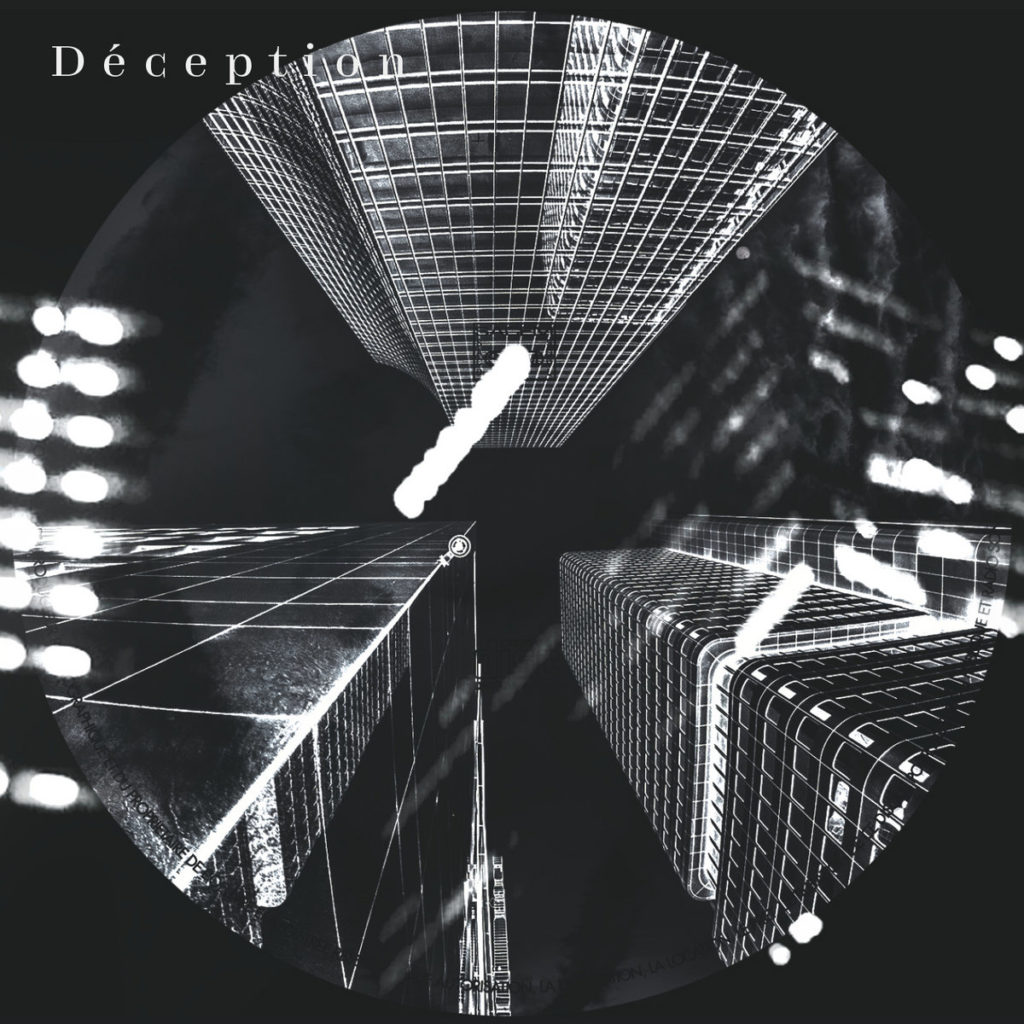
AO: En el disco nombras a los miembros del grupo con números; diría que representa la profunda deshumanización que el proyecto en sí parece desarrollar, ¿es así? ¿Tienen los propios números algún significado propio para vosotros?
(813): Los escogimos de forma casi aleatoria y tienen formato de tres dígitos como suelen ser las extensiones internas en las empresas. Además, prefiero quitar cualquier relación humana a primera vista para dejar que la música hable por si misma. No es necesariamente ser 100% anónimo pero tampoco queremos mostrarnos demasiado.
AO: Últimamente estamos viendo muchas bandas en la escena del black metal que dejan atrás temas típicos como la fantasía, lo históricos, los bosques… En Ateneo Oculto apreciamos especialmente aquellas que traen a la escena temas políticos o sociales (evitando a la extrema derecha, por supuesto), y que tratan de pensar fuera de los clichés. En vuestro caso vemos toques de “urban black metal” distópico como el que puede aparecer en el disco homónino de Amesoeurs, ligeramente en Heretoir y más recientemente en Your Ultimate Urban Nightmare de Bonjour Tristesse y London Orbital de Kassad. No quiero usar el término como una subcultura, si no más como un marco conceptual. ¿Crees que es válido? ¿Te sientes cómodo con esta definición? ¿La actualidad y lo urbano influencia tu trabajo?
(813): Estoy de acuerdo en que es el sonido más que los visuales, incluso, lo que marca el momento en que te encuentras, y sí es un marco conceptual para mí. Creo que cada uno crea según su propio estilo, algunas bandas prefieren un sonido black metal más old school DIY y otras un sonido más post-black/blackgaze, aparte de los visuales urbanos. Mi verdadera revelación fue con los discos de Joy Division. Estaba fascinado por la forma de trabajar su sonido. No hay ciudades en su estética pero es algo que ves el música. Cuando los oigo me digo a mí mismo “el ingeniero de sonido es increíble”. Entiendo todo el sonido post que ha surgido después.
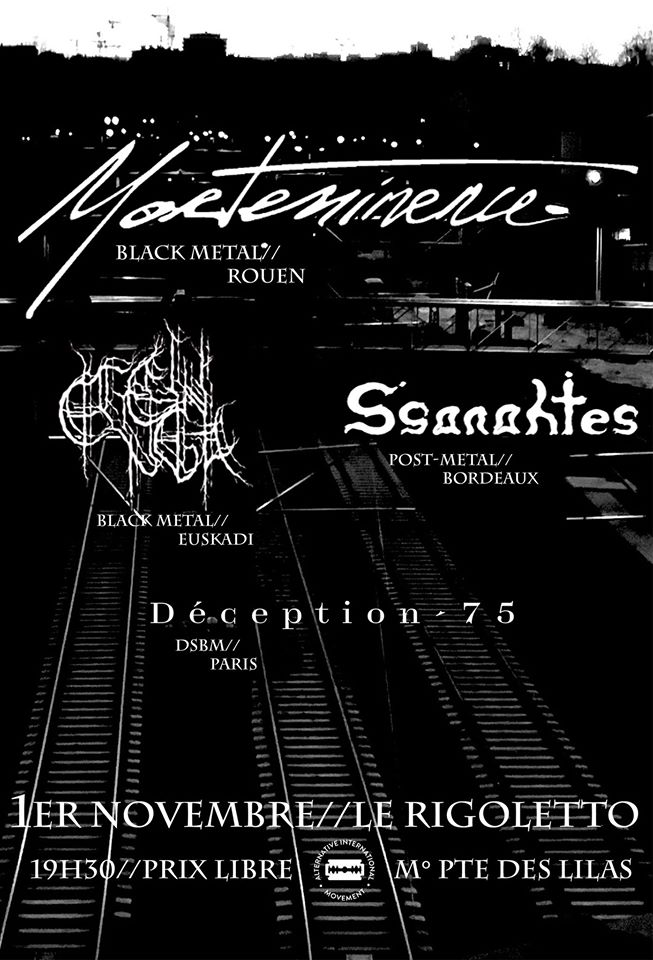
AO: Os hemos visto relacionados o en directo con proyectos como Ssanahtes, Morteminence y Etxegiña (al que un compañero de AO conoció por su propio lado y escribió esto). La bajista tiene un proyecto individual de ambient llamado Kobalt (visitando su bandcamp nos emocionó oir un discurso de Durruti). Imaginamos que sois gente en bandas y proyectos que os conocéis de hace tiempo, ¿no? ¿Colaboráis de otras formas? ¿Nos puedes recomendar otras bandas que debamos conocer aparte de las ya citadas?
(739): (813) y yo nos conocimos hace dos años cuando publiqué el primer EP de ambient de Kobalt, Coppercloud. Comenzamos a colaborar cuando me pidió dar mi propio toque a lo Kobalt en una de las canciones de Déception, Lueur. Déception y Kobalt tienen en común un cierto sentimiento de terror rodeado de una melancolía aplastante; especialmente en mi último disco, Mes nuits grises.
Conocíamos a Waldo (de Etxegiña) y Antonin (de Morteminence) bastante tiempo antes de tocar juntos y también somos buenas amigas de Ssanahtes, Epectase, Acedia Mundi y Toul en Ihuern. Diría que éstas son mis recomendaciones.
(813): Yo añadiría: Vöghräth (Dungeon Synth : The Candle & the Key EP), The IXth Key (Dungeon Synth : October Moon EP), Innocence Ecartelée (Analogic BM : su primer EP se publicará pronto y participo en la voz y la guitarra) y el proyecto propio de (739), Kobalt (Ambient : Mes nuits grises LP, que es increíble). Si te gusta Déception, no puedes dejar de escuchar Kobalt.
[NdE: me declaro ya fan de Kobalt]
AO: Y finalmente, ¿tienes planes de publicar nuevo material pronto? ¿Y de buscar fechas para tocar en directo una vez que la situación con el covid mejore? ¿Podemos soñar en veros alguna vez tocando en España?
(813): Actualmente estoy grabando el nuevo disco y empezaremos a ensayar de nuevo las canciones que ya tenemos pronto; lo que está muy bien. No podemos esperar a tocar de nuevo en directo y que puedas vivir la experiencia completa así que ir a España sería un placer. Gracias por vuestra atención; ¡esperamos poder conocer vuestra escena algún día!
Solo queda añadir un agradecimiento infinito a (813) y el resto de Déception por su arte y por respondernos de forma tan amable a nuestras divagaciones.
Referencias:
Bandcamp de Déception
Bandcamp de Kobalt
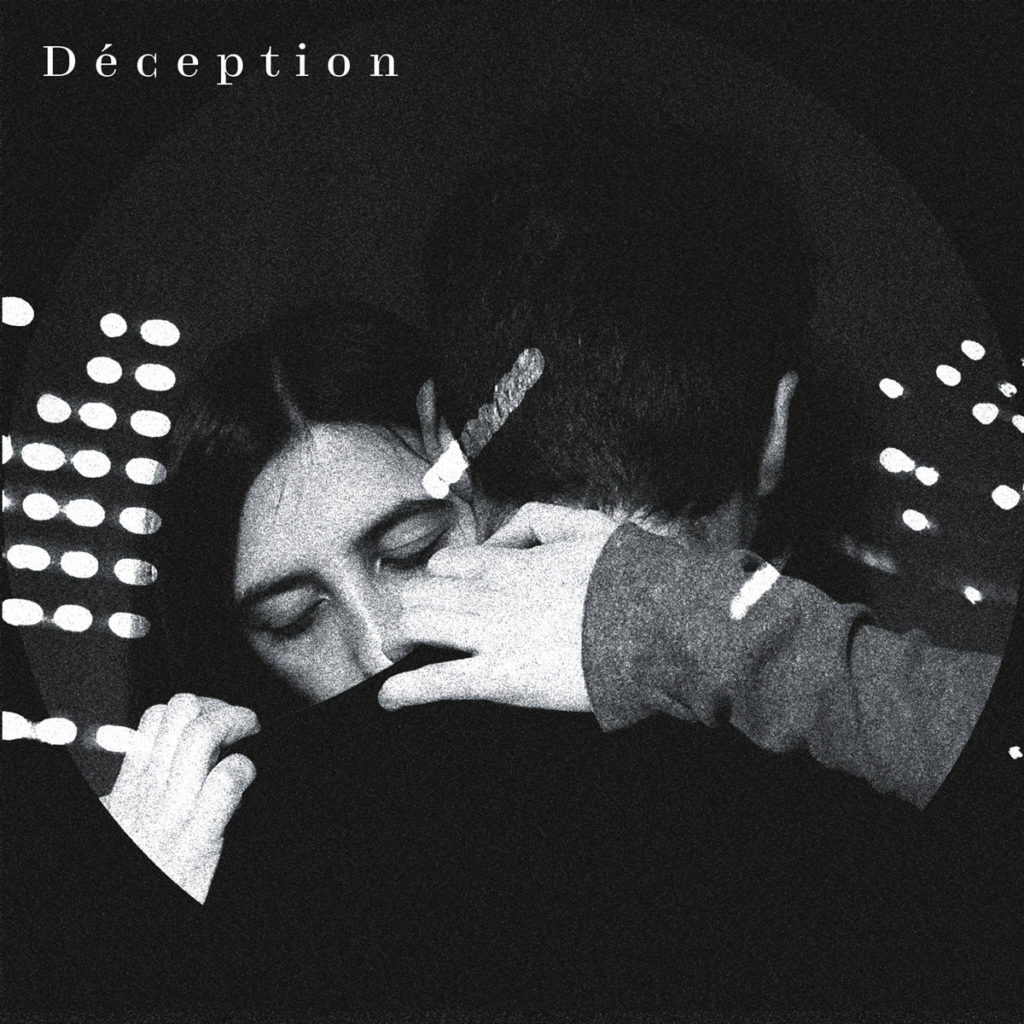
— english —
AO: First of all, this would be my first interview, not on Ateneo Oculto even the first of all, so please be patient and forgive all the cheap talk, misleads, prejudices and fallacies on my side.
I’m aware that I totally lost control with the length of the email. I’m so sorry. I don’t want to overwhelm you, or make you think I’m a psycho; I was trying just to explain to you the feelings and ideas that comes to my mind hearing and watching your work.
Please feel free to intervene in between the paragraphs as you prefer to explain, correct or denounce anything you want and taking the space you need. My first idea is to write a review about the album and distribute the ideas that I bring here throughout the text. So I’ll include your appreciations on it intertwined.
I don’t really remember how I arrive at your Ressources Humaines video on youtube and it deeply touched me. From there I went immediately to bandcamp and read that it was recorded live on studio. So, it was conceived for this very beginning as a whole multimedia art concept?
(813) : The vision was there for a very long time like 4 years ago. It started when I was working as a computer engineer in La Défense near Paris. It’s the big arch you see in the visuals. But the video exists thanks to (404) who works as a video editor. We thought it would be nice to have video projection for live concerts so I asked him to make a video from stock videos with some indications for each song. We really liked the result and he added his own touch so we released the whole clip. We will definitely work together later for Déception and maybe other projects.
AO: We’ve seen that your first album ‘Vacuité de l’existence’ was recorded just by you, but in this one was as a group (due the live enviro of course) and you have played live yet. would you consider to develop the project more than a collective than an individual way of expression?
(813): Ressources Humaines was much more collective than usual as it involved many friends around who helped me, from the live line-up to the video by (404). We had the opportunity to do it as a line-up was created for the concert in November 2019. Next album is being recorded by myself in my bedroom but I may ask people to participate like we did with (739) in Lueur. Also, I prefer to focus on what I like most : being at home recording and working on sound. (404) worked on the video to make the visuals exist and (739) helped to start the live line-up by organizing our first concert. I am lucky enough to be free to do everything I want artistically and having friends who are willing to help.
AO: It has two songs from your first album ‘Vacuité de l’existence’, the single ‘Mourir’ and a new song. We presume that these songs have a common conceptual ground, doesn’t? We’ll try to go deeper lately, but could you briefly tell us why there were the chosen ones?
(813): The whole album Ressources Humaines is our live set that we use to play live at this time. It’s like a postcard of where the line up is at the moment. Lueur and Heureux are played live and sound different. I recorded the vocals from first album from under my bedsheets to avoid the neighbors because I was living in a small studio in Paris at this time. My vocals evolved with rehearsals. I selected Lueur and Heureux which would be interesting to play live. Éteins-toi was impossible to play as I heavily changed the pitch of the guitar in studio and I didn’t feel to play the song Vacuité live. So I composed Mourir to play it as a last song live, and IIA-XVII in last minute to have a good intro for concerts so the total would be around 25 minutes. After the concert, I thought it would be interesting to record our full set live with the video so there is Ressources Humaines. Also, I really wanted to try to mix a live set with my friends playing it. We took a lot of pleasure doing it.
AO: I’ve bought the digital album on BC and I don’t have lyrics so at this point (could you send them to us for the article?), I’ll try to explain how you album and the video makes me feel and the ideas that comes up. Maybe is just an intent of emotional/intellectual connection with you as a creator, so even if I’m totally wrong you could be sure that I profoundly value your work.
(813) : Good point about that lyric stuff. I never wrote them. When I sing, it’s mostly improvised, depending on the song’s emotion and the moment but there are recurrent sentences. In Lueur I say “l’obscénité de la lueur” (the shining is obscene). It refers to the reflection of the building. In Heureux I say “je ne veux plus être heureux” (I don’t want to be happy anymore). It means I don’t want to be happy the way society expects. In Mourir I say “Aimer la vie, aimer souffrir” (Love to live, love to suffer). There is happy stuff and depressing stuff and you cannot separate them. It’s all mixed together. You can feel it in the music. Happiness and sadness are like connected to the same emotion. this is how I feel it in the project. I use to say it’s not because life may be difficult sometimes that it’s not enjoyable. This sentence is a motto for me.
AO: First I was assaulted by a lot of urban magnificent (and emptied) images restrained (seized) on a rectangle and degraded to a grayish colorization. They were constantly deformed by glitches and visual errors of coding. All of this treatment makes me think about the brutal coldness and emptiness that these tall steel buildings, squared streets and concrete monuments contains. Does this kind of modern blank architecture and urbanism have a role on the album?
(813): It’s on the album because this is what I see everyday in the office. It’s mostly a natural feeling. About the glitches in the video, (404) took some of the videos from stock videos and there were super big watermarks. He found an algorithm to remove them but as the watermarks to remove were big, it created glitches. We really liked the idea… (404) told me the glitch is a way to remind you are in a dream.
AO: This concurs with the covid times, of course. I work as computer technician so in the first days of confinement (in Madrid it was widely accepted by the people) I was obliged to go to offices. I was touched by the image of empty streets and roads, so I came again and again to the visual art of your album and music. Particularly one day that I had to go out on evening and risk myself hearing your album as I drove on the city. Do you feel that your album is a tremendous living testimony of our days? It was recorded and thought when this pandemic was just science fiction. Was this album some kind of visionary depiction of a world that could be melted down so easily?
I think the album doesn’t show the world collapsing, but it shows that the world is a failure even without this pandemic. Do you have some kind of “i told you” feeling?
(813): I am really touched by your testimony. In the band, we are 3 computer engineers and fortunately we could work from home. We’re feeling lucky. I had a strange feeling of obviousness. I saw the video a lot of time as we worked on it with (404) before the covid so it was like what was in our heads happened for real. There was already much to say, we didn’t need this. But if this can be a testimony, it’s truly an honor, thank you so much.
AO: Then on “Lueur” we could see the same visual treatment on perfect polished offices, and of course empty ones, as I had to roam on these days. This kind of unnecessary and fake mutual spaces were absolutely stripped of their meaning and power. When I see the dissolve of office chairs in the images I feel some kind of comfortable cold-being. But the song and images that really heartbound me was “Heureux”. That profusion of happy white middle-class families or couples that seems could be used on TV commercials of “fresh banking” defiled by the glitches really took me down. Trying to be a inclement dark journalist of extreme metal, should I feel ashamed to wish that kind of livings?
(813): For Heureux, I told (404) I wanted something different for this song. I wanted stock videos of happy families with children. It was to show what society expects from you, and you see that it is impossible. Those people in the video are actors paid to play in stock videos, this is not real life. This is how I feel. I don’t understand them and they don’t understand me and this will be like this forever. With (404), we agree it shows the perfect life society expects us to have since we are children. There is rejection but also attirance.
AO: Could this album unveils me that I really desire a bedroom in white tones but at the same time all of this has no real meaning? Some kind of “memories in the rain”-alike, the real-fakeness livings devoured by senselessness. Let me say that I don’t feel really anguish with your work, it’s an strange mix of harmless sadness, yearning for the unlived, and lone cold contemplation.
(813) : Yeah, I kinda feel the same. It’s life. Sometimes happy, sometimes sad, sometimes all at the same time. The best is when it’s all at the same time.
AO: Finally on “Mourir” we could how the rhythm speed up, how the day-by-day occurs with no pause carrying us to the end of the album and closer to our own end.
Déception is being depicted as “an enterprise-oriented music project based on bureaucratic values”. Do you try to denounce or just portray this enterprise egregore that consumes us? In a humanity in constant growings, is the future an image of hypertechnologized urban environment dehumanized? should it makes you feel bad?
(813): I wanted to work in computer engineering because I really thought I would do great stuff for great people, and I really thought I would like this corporate life. When I was a children, I saw the buildings from my window and I really wanted to go there. When I was into this for real, everything changed. Déception means « disappointement» in French. There is a kind of innocence loss. Also, I have many difficulties to interact with people and to fit into the working environment, especially open spaces. There is this permanent lack of comprehension with people. This is a very important part of the project. The anti-capitalism in the project is a « background » interpretation I accept. I also feel guilty to work for big companies so I don’t feel personally like an example for advices. But politics is everywhere, whether we want it or not. There is no such thing as being apolitical. I am political as a person like any other human. Politics is not a switch you decide to turn on or off.
AO: On the album you name the members of the group as numbers; I presume this represent the profound dehumanization that the project itself try to develop, don’t? Do the numbers have any inner value for you?
(813): It was randomly chosen and the 3 digits format is the same as internal phone numbers in enterprises. Also, I prefer removing any human consideration in first sight to let music speak. It’s not about being 100% anonymous, but more about not showing up ourselves too much.
AO: Recently we’re viewing a bunch of bands on the black metal scene that talk far away for the woods, historical or fantasy mottos. We really appreciate those bands that brings social or political themes to the scene (avoiding far right, of course), and tries to expand concepts out of the box. In your case, I peek some kind of “urban black metal” that I first sense on the cover of Amesouers homonym album, Heretoir slightly and more recently on Your Ultimate Urban Nightmare of Bonjour Tristesse and Kassad’s London Orbital. I don’t want to use this term as a subculture, just it’s a conceptual framework. Could you share this? Do you feel comfortable with this definition? How the present times and the urban environment influences your work?
(813): I agree with the fact that it is the sound more than the visuals which says where you are at the moment so yes, it’s a framework. I think everyone does their stuff their own way. Some bands may sound like DIY old school black metal with urban visuals, some will be more post-black/blackgaze with urban visuals also. The real « revelation » I had was with Joy Division albums. I was fascinated by the work made on the sound. There is no city in the visuals but you can actually see it through the music. When I heard them I told myself « the sound engineer is amazing ». I understood all the « post » sound right after.
AO: I’ve seen that you play live at least one time with bands like Etxegiña (by completely separate paths another AO partner knew them and wrote this: https://ateneooculto.com/), Ssanahtes and Mortemince; and your bassist have an individual ambient project Kobalt (that Durruti speech wins me). We presume that the bands know each other for a long time, don’t? Do you collaborate on some other ways? Could you recommend us some other bands or projects that should be known by us like these previous ones?
(739): (813) and I met two years ago and at the time Kobalt’s first ambient EP, Coppercloud, had just come out. We began collaborating when he asked me to add my personal touch as Kobalt on one of Déception’s first songs, « Lueur ». Déception and Kobalt both have in common a certain feeling of dread surrounded by crushing melancholy, especially in my latest album, Mes nuits grises.
We’ve known Etxegina’s Waldo and Morteminence’s Antonin for a long time before playing together, and we’re also good friends of Ssanahtes, Epectase, Acedia Mundi and Toul en Ihuern, so that’s for the « recommendations » part, I guess.
(813): I would add : Vöghräth (Dungeon Synth : The Candle & the Key K7), the IXth Key (Dungeon Synth : October Moon K7), Innocence Ecartelée (Analogic BM : First K7 being released soon, I do vocals and guitar) and (739)’s own project Kobalt (Ambient : Mes nuits grises full-lenght) which is awesome. If you like Déception you cannot pass through Kobalt.
AO: And finally, do you have plans to publish new material soon? Or find dates to play live if some day the covid situation goes better? Could we dream to have you playing live in Spain?
(813) : I am currently recording the next album, we start rehearsing again our existing songs with the whole line-up and it feels really good, we can’t wait to play live again so you can have the whole experience in front of you. We would go to Spain with pleasure.
Thanks a lot for your help, we would love to meet your scene any time !

